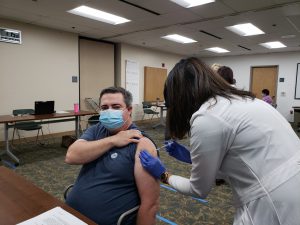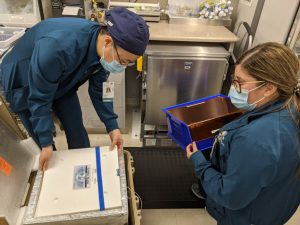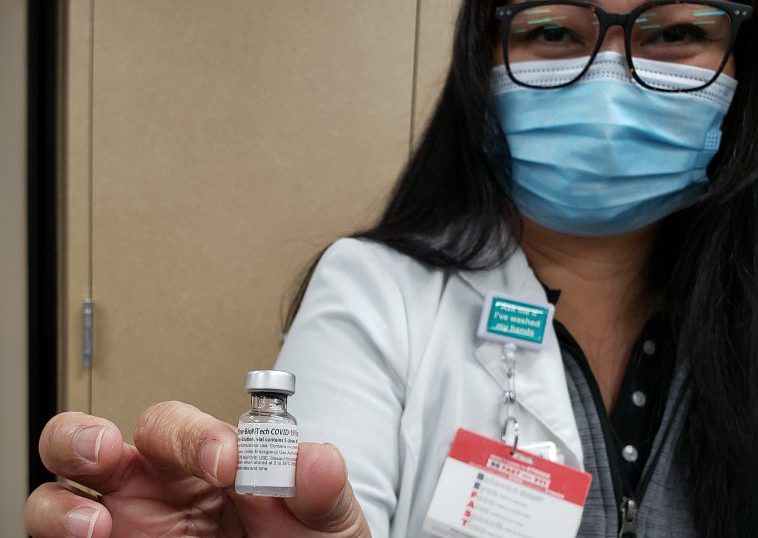A San Joaquin County hospital became one of the first rural California hospitals to receive its initial allotment of the FDA-approved Pfizer COVID-19 vaccine and started vaccinating its front-line workers this week.
This is welcome news to the nurses and doctors at Sutter Tracy Community Hospital, which is located in the coronavirus hotspot of the San Joaquin Valley and has cared for many COVID-19 patients. The 84-bed Tracy hospital’s staff provides the hands-on care for COVID-19 patients while receiving 24/7 support from critical-care physicians and specialty nurses in Sutter’s electronic intensive care unit hub in Sacramento, saving some patients from having to be transferred to larger hospitals many miles away.
Sutter Tracy also is the first hospital in the Sutter Health network to receive the Pfizer vaccine. Shipments are arriving this week at 20 Sutter hospitals caring for COVID-19 patients.
Hospitals and healthcare leaders for weeks have been working feverishly to implement plans to vaccinate their nurses, doctors and other front-line workers with the vaccine.

Emergency Department registered nurse Mike Morrow is first at Sutter Tracy Community Hospital in California to receive Pfizer’s COVID-19 vaccine administered by nurse practitioner Forum Patel. (Dec. 16, 2020)
“As soon as the vaccines arrive onsite,” said Ryan Stice, Sutter Health vice president of pharmacy, “we’ll be ready to start vaccinating our front-line workers within hours.”
Stice says Sutter, an integrated healthcare system serving 22 counties in Northern California, has been partnering at multiple levels with state teams on the vaccine’s arrival.
“It now comes down to that last mile, the interaction between our hospital CEOs and the local county health departments,” Stice says. “We’ve been living this terrible pandemic since March, and we want to make sure our staff is protected and able to continue to care for the public.”
Cold storage units able to handle hundreds of vials of the vaccine have been installed in hospitals across Northern California, awaiting the delivery of the vaccine. Pfizer’s vaccine must be stored at a temperature of -70°C, which is colder than winter in Antarctica. This type of ultra-cold storage requirement means hospitals have had to work diligently to secure specialized ultra-low temp freezers, which are not typically needed to store most medications and vaccines.
Vaccine Can’t Give You COVID-19
On Dec. 11, the U.S. Food and Drug Administration announced Emergency Use Authorization of the Pfizer-BioNTech Covid-19 vaccine. Other countries, including Britain, Bahrain, Canada, Saudi Arabia and Mexico have also cleared the vaccine for similar use.
Manufacturer data on the Pfizer vaccine shows it to be safe and effective, which in part is what allowed the FDA to issue the authorization last week. The Pfizer vaccine, along with the other vaccine candidates anticipated to meet FDA approval, will continue to be studied for long-term effectiveness, among other factors.

Pharmacy workers at Sutter Tracy Community Hospital unbox Pfizer’s COVID-19 vaccine shipment which arrived on Dec. 15, 2020.
“While vaccines are developed in different ways using different methods, it’s important to remember that they cannot give you COVID-19,” said William Isenberg, M.D., Sutter Health vice president and chief quality & safety officer.
Vaccine Prioritization
Vaccine distribution and allocation—including how much, of which vaccine (Pfizer and forthcoming Moderna) and when—is being led by health departments at the county level. Being ready for swift deployment is key, however.
According to California Gov. Gavin Newson, priority will be first be given to front-line workers who are at a higher risk of COVID-19 exposure at work. This first grouping includes the following:
- Doctors, nurses, respiratory therapists; examples include emergency room nurses and physicians
- Staff who clean hospital rooms
- Food service workers
- Reception staff who greet patients
Sutter Health, in accordance with guidance from public health officials, has broken this tiered level down further.
“We are being very thoughtful in how we protect our team members,” Stice said. “What we decided was based on the level of contact with patients who are most likely to be COVID-19 positive. Instead of breaking it down by what letters are after your name, we turned it around to focus on how each worker interacts with patients and their level of risk.”
Alex Azar, U.S. Health and Human Services secretary, predicted that 20 million people will be vaccinated in the “the next several weeks,” with as many as 50 million total vaccines being given in the U.S. by the end of January 2021.
In order to have a significant level of protection from this novel coronavirus, two doses of the Pfizer vaccines are required, and they are administered three weeks apart.
Vaccine an Important Tool in COVID Fight
“Though these vaccines represent an important step in the right direction, they won’t end the pandemic,” says Dr. Isenberg.
Masking, physical distancing and other precautions continue to be critical tools in preventing transmission until a large percentage of the population is vaccinated and data shows that the vaccines provide long-term protection.





